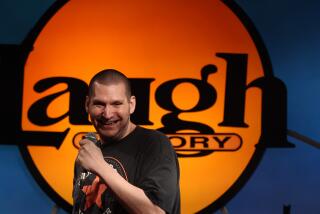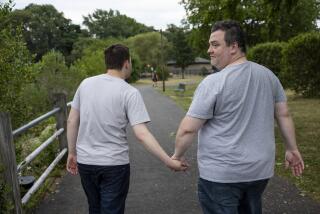‘I didn’t know I would take that long. I was pleased that my knees didn’t go out during the race. My legs lasted long.’ --Allan Myerson,marathon finisher : Marathon Man Puts Distance Between Himself and Autism
WHITTIER — He runs--this little guy who became a marathon man and an inspiration--and tries to burst a little farther from the shell that autism has kept him in for so long.
He runs alone through the streets and into the hills, and is loved by the old ladies and dogs he passes.
He runs with a slight jerking motion. His neurological disorder does not permit fluidity.
But Allan Myerson is getting smoother, which is the story of his life.
“Allan’s a bad boy,” Myerson kept repeating 12 years ago when he met his future foster father, Joe Sanders. It took Sanders two hours to coax him out from under a table.
Last month, Myerson, now 20 years old and a graduate of Whittier High School, ran the Los Angeles Marathon in 4 hours and 48 minutes. He did it less than a year after he took up running.
Myerson was at Whittier College one afternoon last week, showing Sanders what he does as a part-time employee for the college grounds department.
“This is where I turn on the sprinklers,” Myerson said.
Site of First Run Visited
They walked to the athletic field, where Myerson first took up running last Memorial Day. It lay before an empty grandstand and was quiet except for birds, wind and the cindery crunches that came from a red track.
Myerson wore red shorts, a blue L.A. Marathon T-shirt and socks that stretched over his calves. Next to the 230-pound Sanders, his slightness--140 pounds on a 5-foot-9 frame--was underlined, but the veins in his forearms bespoke months of hard workouts.
“It makes me feel better . . . it makes me into better con dition ,” Myerson said of running.
His words came out slowly at first and quivered like words on a record played at the wrong speed. But, as he gathered confidence, the sentence progressed more steadily toward a precisely enunciated conclusion.
“This is where I was first taught how to swing my arms and stuff,” Myerson went on. “I had a tri-ath-lete training me.”
Myerson had never done anything athletic. At Whittier High, he was the manager of the football and baseball teams.
‘I’d Like to Do That’
“He was watching TV, I think it was a track meet, and he turned to me and said, ‘I’d like to do that.’ ” Sanders said. “He just decided that is what he wanted to do.”
When he started, Myerson could not make it around the track, Sanders said.
But after nine months of determination and dedication that amazed and inspired all who watched, Myerson ran 26.2 miles and finished ahead of about 5,000 people in a 15,000-contestant race.
“It was exciting on marathon day, one of my more moving moments,” Sanders said. “We had about 30 people down there, and when he came through, we were cheering and crying. But he was fairly unaffected.”
“I was happy that I finished it,” Myerson said.
“You were a little disappointed with your time, weren’t you?” Sanders said, eager to help this young man whom he and his wife, Judy, took in when he was 8 so that he would not have to go to a state hospital.
“I mean, I didn’t know I would take that long,” said Myerson, who had expected to finish in 3:30. “I was pleased that my knees didn’t go out during the race,” Myerson said. “My legs lasted long.”
Enjoys Running Along Streets
“His training was grueling,” Sanders said. “He’d run from our house (in Whittier) to Knott’s Berry Farm and back.”
“I did it by myself,” Myerson said. “That’s my favorite thing, running on streets. You can see a lot of different things, a lot of buildings and houses.”
As he runs he thinks.
“I think about wanting to . . . be . . . in good shape and think about adopting my coach’s--what’s it called?--stamina.”
As an autistic person given to strange behavior, Myerson was often the target of cruel jokes in school.
“Back then, I was very vulnerable and stuff,” he said. “I’m different now, people are nice now, plus I’ve learned how to act more mature.”
Autism has been clinically defined as a “severely incapacitating lifelong developmental disability.”
Myerson gave his own definition: “You mean somebody who’s obsessed with things or somebody who goes around bugging people.”
Did Some Annoying Things
When Myerson was younger, Sanders said, “He’d fix on a light switch, turn it off and on. Or he would spin around in a circle for hours. One of the more annoying things was he’d constantly repeat the same thing. Now he understands these things are inappropriate, and knows that he has to manage them. I still think it’s somewhat of a struggle for him.”
Myerson laughed and said he does not spin anymore.
“Now I do know that stuff like flipping lights on and off or playing with water sprinklers for hours is inappropriate.”
Sanders said Myerson’s progress has been dramatic, but feared that the physical stress of long-distance running would cause his foster son to regress.
“When he got tired (on the track), he’d make strange noises and swear loudly,” said Sanders, who would run with Myerson. “I pulled him over and said, ‘If you’re going to run you’re going to have to manage your behavior at the same time.”’
But running has turned out to be excellent therapy.
“Autistic people are pretty much isolated, with no real close friends.” said Sanders, 39, who is assistant to the editor of the Orange County edition of the Times. “This gets him out in the community. He enjoys the attention he gets.”
Takes Job Seriously
Myerson is also dedicated to his groundskeeping, which pleases Sanders, who never dreamed Myerson would be able to hold a job.
The day after the marathon, Myerson was so sore that he could not walk to his job at the college. Sanders suggested he take the day off, but Myerson insisted that he be taken to work.
Myerson is trying to decide what marathon to run next.
His coach, Rubin Johnson of Whittier, the triathlete, said, “I think he can still do a lot better. His time was good for the first time (in a marathon). He can shoot for under 3 (hours) without too much trouble. He’s highly motivated.”
After his morning job, Myerson attends a program in which disabled people are taught independent living skills. He has learned well.
“He goes on a bus to the San Fernando Valley to visit his mother,” Sanders said. “He transfers in downtown Los Angeles. We send him out with a prayer and hope he makes it. He wants to be independent. We can’t see placing ourselves between him and the rest of the world.”
After a photographer shot some pictures of Myerson running, it was time to leave the track.
“Can I say something?” Myerson asked. “Like, if anybody wants to run, I’ll be glad to help them.”
“You can help me,” Sanders said.
More to Read
Go beyond the scoreboard
Get the latest on L.A.'s teams in the daily Sports Report newsletter.
You may occasionally receive promotional content from the Los Angeles Times.










